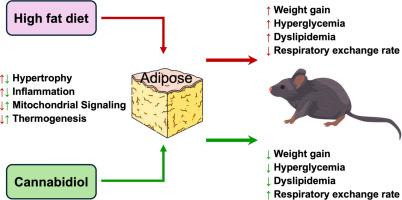膳食大麻二酚油减轻高脂肪饮食引起的肥胖小鼠的代谢功能障碍。
IF 4.9
2区 医学
Q1 BIOCHEMISTRY & MOLECULAR BIOLOGY
引用次数: 0
摘要
代谢综合征(MetS)是一种广泛的健康问题,主要由饮食选择和缺乏运动等生活方式行为引起。过量的热量摄入会促进肥胖和脂肪组织代谢信号的失调。本研究采用饮食引起的肥胖小鼠模型来评估大麻二酚(CBD)(一种大麻衍生的植物化学物质)减轻代谢功能障碍的能力。5周大的小鼠接受标准饮食或高脂肪饮食(HF),含或不含CBD (25 mg/kg bw),为期9周。补充CBD可降低HF小鼠的体重增加和血清葡萄糖浓度。这些改善伴随着白色脂肪组织质量的减少和脂肪细胞大小的减小。此外,CBD治疗恢复了腹股沟和附睾脂肪组织中关键代谢调节因子的蛋白质水平,包括过氧化物酶体增殖体激活受体-γ辅激活因子1 α和Sirtuin 1。与此一致的是,补充CBD上调了Prdm16的mRNA表达,并在mRNA和蛋白质水平上促进了解偶联蛋白1的表达,显示了脂肪组织的褐变。在上游,补充CBD增加了HF小鼠的瞬时受体电位香草素1 (TRPV1)的mRNA和蛋白质水平,这可能有助于协调观察到的改善。综上所述,饮食中的CBD可能通过促进白色脂肪组织褐变来减轻hf小鼠的体重增加并改善其代谢健康。本文章由计算机程序翻译,如有差异,请以英文原文为准。

Dietary cannabidiol oil mitigates metabolic dysfunction in mice with high-fat diet-induced obesity
Metabolic syndrome (MetS) is a widespread health concern driven largely by lifestyle behaviors such as dietary choices and physical inactivity. Excessive caloric intake promotes adiposity and dysregulation of metabolic signaling in adipose tissue. This study employed a mouse model of diet-induced obesity to evaluate the ability of cannabidiol (CBD), a cannabis-derived phytochemical, to mitigate metabolic dysfunction. Five-week-old mice received a standard diet or a high-fat diet (HF) with or without CBD (25 mg/kg bw) for 9 weeks. CBD supplementation reduced weight gain and lowered serum glucose concentration in HF mice. These improvements were accompanied by reduced white adipose tissue mass and smaller adipocyte size. Additionally, CBD treatment recovered protein levels of key metabolic regulators, including peroxisome proliferator-activated receptor-γ coactivator 1 alpha and Sirtuin 1, in both inguinal and epididymal adipose tissues. Consistently, CBD supplementation upregulated the mRNA expression of Prdm16 and promoted uncoupling protein 1 at both mRNA and protein levels, showing the browning of adipose tissues. Upstream, CBD supplementation increased transient receptor potential vanilloid 1 (TRPV1) in HF mice at both the mRNA and protein levels, which possibly helped orchestrate the observed improvements. In summary, dietary CBD mitigates weight gain and improves the metabolic health of HF-challenged mice, potentially through the promotion of white adipose tissue browning.
求助全文
通过发布文献求助,成功后即可免费获取论文全文。
去求助
来源期刊

Journal of Nutritional Biochemistry
医学-生化与分子生物学
CiteScore
9.50
自引率
3.60%
发文量
237
审稿时长
68 days
期刊介绍:
Devoted to advancements in nutritional sciences, The Journal of Nutritional Biochemistry presents experimental nutrition research as it relates to: biochemistry, molecular biology, toxicology, or physiology.
Rigorous reviews by an international editorial board of distinguished scientists ensure publication of the most current and key research being conducted in nutrition at the cellular, animal and human level. In addition to its monthly features of critical reviews and research articles, The Journal of Nutritional Biochemistry also periodically publishes emerging issues, experimental methods, and other types of articles.
 求助内容:
求助内容: 应助结果提醒方式:
应助结果提醒方式:


